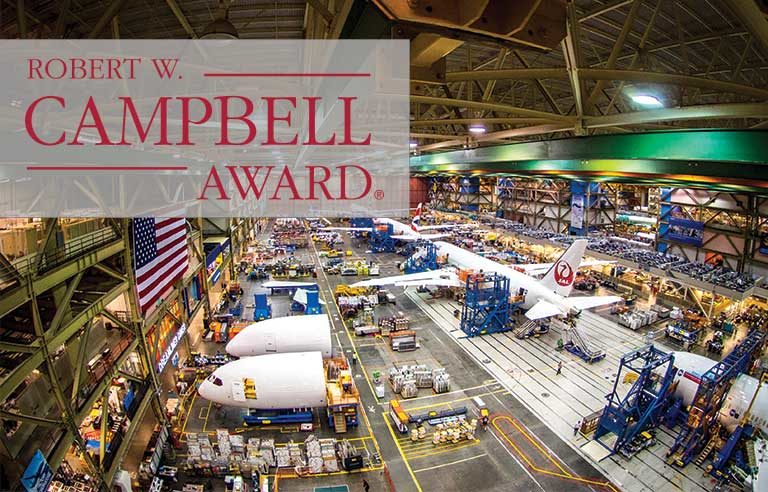‘Safety first, all the time’
The Boeing Co. is the 2018 recipient of the Robert W. Campbell Award

As the world’s largest aerospace company and a leader in aircraft manufacturing, the Boeing Co. strives to set the standard in environmental, health and safety, as well as innovation.
“Our products connect the world for people,” said Jenette Ramos, senior vice president of manufacturing, supply chain and operations at Boeing. “We have technology that takes us to the outer reaches of this galaxy, so just think about what we have to be building into the design of our products. It has to be safety first, all the time.”
By maintaining a strong safety record while remaining at the forefront of the aviation and aerospace industries, Boeing has earned recognition as the 2018 recipient of the Robert W. Campbell Award. The Campbell Institute at the National Safety Council presents the award annually to an organization that successfully integrates EHS management with business operations.
Chicago-based Boeing employs more than 140,000 people in all 50 states and nearly 70 countries, and has built nearly half of the passenger aircraft that transport more than 9 million passengers around the world each day.
Recalling the award assessment process, Campbell Institute Program Manager Katherine Smith lauded Boeing for its visionary approach to fusing safety with innovation. “They see that the space, or the concept of innovation, is something that’s going to be a business driver for them in the future, so they purposefully make a lot of investments in that area,” she said. “That will not only make them a safer company, it will make the industry safer, and, because they are willing to share, companies outside of aerospace will benefit as well.”
Going for zero
In 2012, a series of tragic incidents involving factory operations at Boeing occurred in short succession. The events prompted Boeing officials to re-evaluate their organizational approach to EHS.
“We knew we had to do something different,” Ramos said. “Workplace safety had to be reinforced as a value with support from the highest levels of the company – to this day, safety is still our No. 1 focus.”
Gathered at a Boeing factory in St. Louis, the organization’s executive council conducted what proved to be a pivotal safety stand-down. As thousands of managers watched via live webcast, council members signed the Boeing Safety Promise to signal the launch of the organization’s new workplace safety program, “Go for Zero – One Day at a Time,” a streamlined endeavor geared toward constant communication and accountability among workers.
Every year, Boeing also conducts a Safety Promise, during which managers lead teams through safety conversations and employees pledge to work toward eliminating workplace injuries.
“Our goal of an incident- and injury-free workplace is achieved by empowering our employees to think about safety in all that they do,” Ramos said. “The annual Safety Promise is not only a tangible reminder of our company’s dedication to employee safety and well-being, it is also a personal responsibility.”
Additionally, Boeing introduced four safety guiding principles intended to shape its culture:
- We value human life and well-being above all else and take actions accordingly.
- All incidents, injuries and workplace illnesses are preventable.
- We are personally accountable for our own, and collectively responsible for each other’s, safety.
- By committing to safety first, we advance our goals for quality, cost and schedule.
“We developed inspiring statements that strengthened our commitment to safety,” Ramos said.
With regard to the principles, the second one in particular was intentionally worded, she added.
“That was a mindset shift for us because we needed to strengthen our perspective that everything is preventable,” Ramos said, “which I was excited about because our near-miss reporting and the energy around prevention really operationalized just by that statement that each and every one of us are personally accountable for our own safety and each other as a team.”
Since introducing “Go for Zero,” Boeing has reduced serious incidents by 59 percent and experienced 35 percent fewer injuries while increasing production by 25 percent, Ramos said. These developments dovetail with the company’s mission to bring the latest technology to its aircraft, allowing them to depart on time and be more environmentally friendly.
Boeing also has surpassed targets for resource conservation, improving its environmental performance and reducing its footprint. From 2012 to 2017, Boeing generated fewer greenhouse gas emissions, used less water, sent less solid waste to landfills and generated less hazardous waste – all reduced to 26 percent from 14 percent. The significant improvements came during a time of unparalleled growth in its business, with record airplane deliveries.
Leadership and engagement
Ramos said she believes small or medium-sized organizations can adopt much of Boeing’s approach to safety, starting with leadership and employee engagement. After talking with numerous Boeing officials during the award assessment process, Smith and her Campbell Institute counterparts can attest to the swift effectiveness of the “Go for Zero” message among employees.
“They were able to achieve a huge amount of improvement in a very small amount of time,” Smith said. “That speaks to their leadership, their dedication and their ability to communicate with their employees. You don’t experience culture shift within an organization that quickly without them being on top of things. They’re just doing a really good job.”
Post a comment to this article
Safety+Health welcomes comments that promote respectful dialogue. Please stay on topic. Comments that contain personal attacks, profanity or abusive language – or those aggressively promoting products or services – will be removed. We reserve the right to determine which comments violate our comment policy. (Anonymous comments are welcome; merely skip the “name” field in the comment box. An email address is required but will not be included with your comment.)


